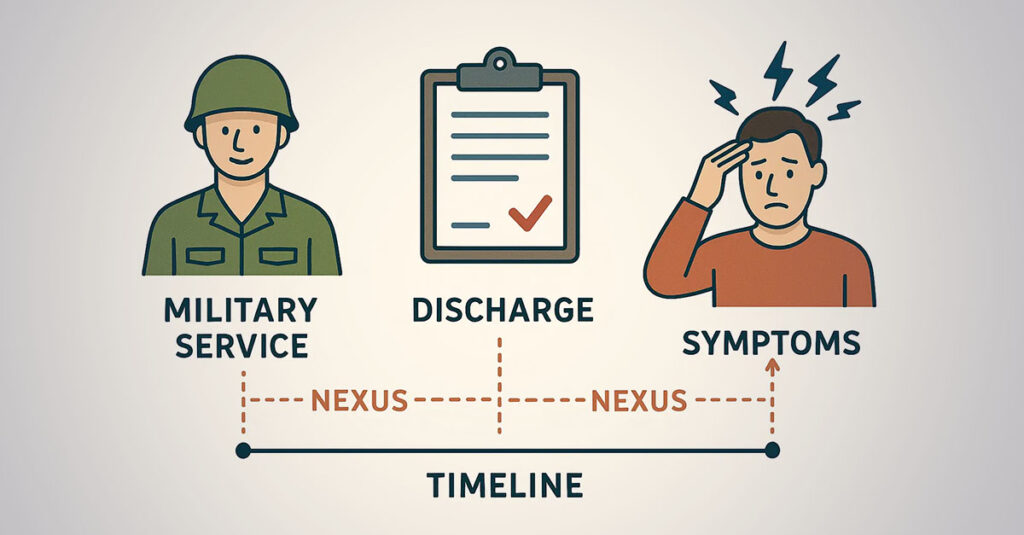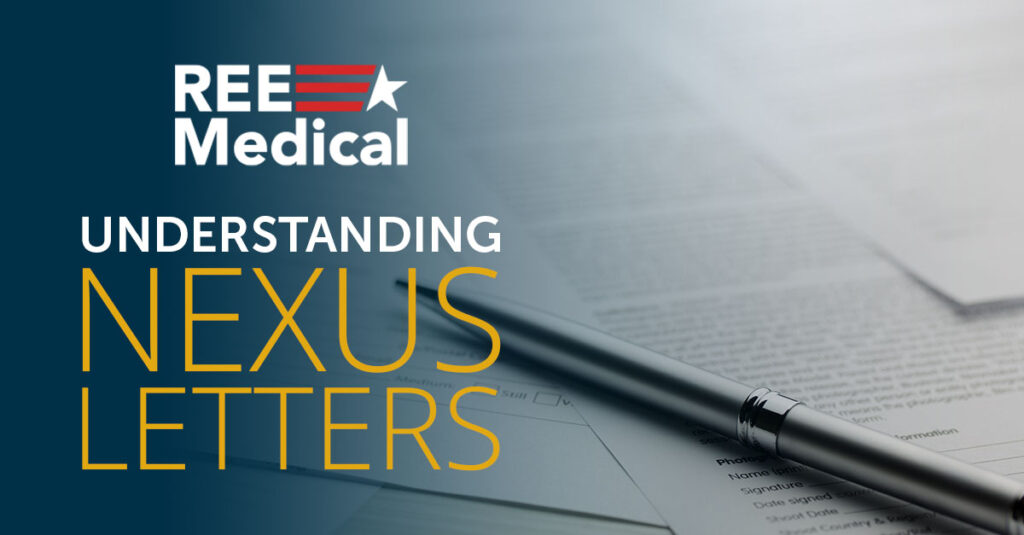Establishing service connection is one of the most critical—and often challenging—aspects of VA disability claims. While many veterans have clear diagnoses of their current medical conditions, proving that these conditions resulted from military service can be complex, especially when service medical records are incomplete or the connection isn’t immediately obvious. This is where a nexus letter can be relevant. A nexus letter for VA claims is an independent medical opinion that provides the clinical analysis connecting a veteran’s current condition to their military service. Understanding how nexus letters work, when they’re used, and how they differ from other medical documentation helps clarify how the VA reviews medical evidence.
Table of Contents
- What Is a Nexus Letter for VA Claims?
- How the VA Uses Nexus Letters and Medical Evidence
- When a Nexus Letter May Be Relevant to Your VA Claim
- The Difference Between DBQs and Nexus Letters
- How Veterans Can Obtain Nexus Letters and Medical Documentation
- Frequently Asked Questions About VA Nexus Letters
TL;DR
- A nexus letter is a medical opinion prepared by a licensed healthcare provider that addresses whether there is a connection between a current medical condition and military service.
- The VA requires three elements for service connection: current diagnosis, in-service event, and medical evidence linking them (the nexus)
- Nexus letters are often used when service records are incomplete, conditions are complex, or previous decisions cited insufficient medical evidence.
- DBQs document “what” (current condition severity) while nexus letters explain “why” (service connection)
- REE Medical coordinates DBQ services for documenting current conditions
- Claim Climbers (REE Medical’s exclusive partner) coordinates nexus letter services for establishing service connection
- The VA evaluates all evidence and may give appropriate weight to opinions from qualified specialists that include detailed medical rationale.
- No service can guarantee outcomes – only the VA makes final rating determinations

What Is a Nexus Letter for VA Claims?
A nexus letter for VA claims is an independent medical opinion prepared by a licensed healthcare professional that evaluates the connection between a veteran’s current medical condition and their military service. The term “nexus” refers to the medical link or connection that the VA requires when establishing service connection for disability benefits.
The VA evaluates service connection by examining three core elements: a current medical diagnosis, evidence of an in-service event or exposure, and medical documentation that connects the two. When service medical records are incomplete or when the connection between a condition and military service is not immediately apparent from existing records, a nexus letter can provide the clinical analysis the VA needs to understand this relationship.
Nexus letters are clinical evaluations prepared by healthcare providers who review a veteran’s complete medical history, including service treatment records, post-service medical documentation, and diagnostic findings. The provider offers a professional medical opinion about whether the current condition is related to military service, often addressing the ‘at least as likely as not’ (≈50% probability or greater) evidentiary language used in VA evaluations.

How the VA Uses Nexus Letters and Medical Evidence
The Department of Veterans Affairs evaluates disability claims based on documented medical evidence. When the VA reviews a claim, it examines whether sufficient medical documentation exists to make a rating determination.
According to the VA’s regulations on medical examinations and opinions, veterans who submit comprehensive medical evidence may allow the VA to complete its evaluation without requiring additional examinations. The VA’s Compensation & Pension (C&P) examination program exists to gather medical information when submitted evidence is insufficient for the VA to make a determination.
Nexus letters prepared by qualified healthcare providers serve as part of the evidentiary record the VA reviews. These medical opinions document clinical findings and provide medical analysis of the relationship between diagnosed conditions and military service events or exposures.
The strength of nexus letters varies based on several factors. According to VA guidance on medical evidence, the VA typically gives more weight to opinions from specialists in the relevant medical field who have thoroughly reviewed both service and post-service medical records. Nexus letters that include detailed medical rationale explaining why a condition is service-connected tend to be more persuasive than conclusory statements without supporting analysis.

When a Nexus Letter May Be Relevant to Your VA Claim
Nexus letters may be particularly relevant in several scenarios:
Complex Medical Conditions: Some conditions involve intricate medical relationships that benefit from specialized clinical analysis. For example, establishing that a current orthopedic condition resulted from an inadequately documented service injury may require detailed biomechanical analysis in a nexus letter.
Incomplete Service Records: Veterans who served in combat environments or at remote duty stations may have service medical records that do not fully document injuries or exposures. Nexus letters can provide clinical analysis connecting current conditions to service events when contemporaneous documentation is limited. Learn more about approaches to incomplete military records.
Secondary Conditions: When a service-connected condition causes or aggravates another condition, medical documentation establishing this causal relationship supports secondary service connection. Nexus letters can analyze and document these medical relationships. Understanding secondary service connection can be critical for veterans with multiple interconnected conditions.
Previously Denied Claims: Veterans whose claims were denied due to insufficient medical evidence may benefit from comprehensive nexus letters that address the specific evidentiary gaps identified in the denial.
Rare or Unusual Conditions: Conditions that VA examiners may be less familiar with can benefit from nexus letters prepared by specialists who regularly diagnose and treat those specific conditions.
The Difference Between DBQs and Nexus Letters
Two types of medical documentation play distinct roles in VA disability evaluations:
Disability Benefits Questionnaires (DBQs)
DBQs are standardized forms designed by the VA that capture medical information in the format the VA uses for rating determinations. Each condition has a corresponding DBQ with questions addressing the specific diagnostic criteria the VA applies when determining disability percentages.
DBQs document:
- Current diagnoses using clinical terminology
- Symptom severity and frequency
- Functional limitations and impact on daily activities
- Objective clinical findings from physical examination
- Diagnostic test results and imaging findings
DBQs serve as comprehensive medical documentation of a veteran’s current condition and its functional impact. When completed by qualified healthcare providers, DBQs provide the VA with standardized medical information that aligns with VA evaluation criteria.
REE Medical coordinates access to independent, licensed healthcare professionals who complete thorough and accurate DBQs. These evaluations provide medical documentation that clearly reflects the scope of a veteran’s condition in the format the VA uses for rating determinations. Learn more about DBQs and how they work.

Nexus Letters (Independent Medical Opinions)
Nexus letters address a different evidentiary question: whether a current medical condition is connected to military service. While DBQs document what the condition is and how severe it is, nexus letters analyze why the condition is service-related.
Nexus letters typically include:
- Comprehensive review of service treatment records
- Analysis of post-service medical history
- Clinical examination findings (when applicable)
- Medical rationale explaining the connection to service
- Opinion stated to a reasonable degree of medical certainty
The medical provider reviews all available evidence and provides a professional opinion about whether the veteran’s military service caused or aggravated the current condition. This opinion addresses the medical nexus—the clinical connection between service and current disability.

Where Nexus Letters and DBQs Are Coordinated (Partners)
Veterans seeking comprehensive medical documentation for VA disability claims have several options:
For Disability Benefits Questionnaires (DBQs)
REE Medical coordinates connections between veterans and independent healthcare providers who specialize in VA disability evaluations. REE Medical’s network includes licensed medical professionals who understand VA documentation requirements and complete thorough, accurate DBQs.
REE Medical provides transparent, flat-rate pricing with no hidden fees or commission-based charges. Veterans understand costs upfront and the specific services they receive. REE Medical offers complimentary consultations to explain how independent medical documentation is coordinated. Schedule a consultation with REE Medical to discuss your documentation needs.
For Nexus Letters (Independent Medical Opinions)
Claim Climbers is REE Medical’s exclusive partner for nexus letter services. Claim Climbers specializes in coordinating nexus letters prepared by qualified healthcare providers who can analyze the connection between current conditions and military service.
Veterans who need nexus letters to establish service connection can learn more about Claim Climbers’ services at ClaimClimbers.com. Claim Climbers provides veterans with access to medical professionals who prepare comprehensive nexus letters addressing the specific evidentiary standards the VA applies.
Through this partnership, veterans can access comprehensive DBQ documentation through REE Medical and specialized nexus letter services through Claim Climbers, providing a complete medical evidence solution.

Frequently Asked Questions About VA Nexus Letters
What is the difference between a C&P exam and a nexus letter?
According to the VA, Compensation & Pension (C&P) examinations are medical evaluations scheduled by the VA when submitted evidence is insufficient for the VA to make a rating determination. The VA provides these examinations at no cost to veterans, and veterans are assigned to VA examiners or contract providers.
Nexus letters are medical opinions obtained from healthcare providers outside the VA. Veterans may work with Claim Climbers (REE Medical’s exclusive partner) to coordinate access to providers who prepare nexus letters.
How does the VA consider nexus letters?
Per VA regulations, the VA evaluates all medical evidence submitted as part of a claim. Nexus letters are assessed based on factors including the provider’s qualifications, whether the provider reviewed relevant records, the thoroughness of the evaluation, and the medical rationale provided.
The VA is not bound to accept any particular nexus letter but considers all submitted evidence when making rating determinations. Nexus letters from qualified specialists who have thoroughly reviewed service and post-service records and provided detailed medical rationale are typically given appropriate weight in the VA’s evaluation.
When do veterans typically obtain a nexus letter?
Veterans may consider obtaining a nexus letter when:
- Service medical records are incomplete or missing
- The connection between a current condition and military service is not immediately apparent
- Previous claims were denied due to insufficient medical evidence
- Multiple complex medical conditions are interconnected
- Specialized medical expertise would benefit the evaluation
- Secondary service connection needs to be established
Veterans may review options with service organizations or medical documentation coordination partners to understand whether a nexus letter is appropriate for their situation.
How do DBQs and nexus letters work together?
These two types of medical documentation serve complementary purposes in establishing service connection:
DBQs document the current diagnosis, symptom severity, and functional impact—answering “what is the condition and how severe is it?” REE Medical coordinates access to healthcare providers who complete thorough DBQs.
Nexus letters analyze the connection to service—answering “is this condition related to military service and why?” Claim Climbers, REE Medical’s exclusive partner for nexus letter services, coordinates access to providers who prepare comprehensive nexus letters addressing service connection.
Together, these evaluations provide complete medical evidence: documentation of the current condition’s scope and severity, plus medical analysis establishing the connection to military service.

What qualifications do providers need to have to complete a nexus letter?
According to VA guidance, nexus letters should be completed by healthcare providers who:
- Hold appropriate medical licenses in their field
- Have clinical experience diagnosing and treating the relevant condition
- Understand VA evaluation criteria and medical evidence standards
- Have reviewed all relevant medical records before forming opinions
- Can provide detailed medical rationale for their conclusions
For nexus letters, specialists in the relevant medical field who regularly diagnose and treat the condition typically provide the most persuasive analysis. The provider’s credentials, experience, and the thoroughness of their review are important factors the VA considers when evaluating nexus letters.
How long does it take to obtain a nexus letter?
Timelines vary based on several factors:
Timelines vary based on scheduling, record volume, evaluation complexity, and provider availability. For current timeframes, contact REE Medical for DBQs and Claim Climbers for nexus letters.
For nexus letters through Claim Climbers, timelines depend on the complexity of the case, the volume of records to be reviewed, and provider availability. Veterans should contact Claim Climbers directly to understand current timelines for nexus letter services.
After documentation is submitted to the VA, processing times depend on the VA’s current workload and the complexity of the claim.
Can a nexus letter guarantee a favorable VA decision?
No medical documentation service can guarantee VA outcomes. The Department of Veterans Affairs is the only agency that makes determinations regarding service connection and disability ratings.
Nexus letters provide comprehensive, accurate medical evidence for the VA to review as part of the claim file for the VA to review. The quality and thoroughness of a nexus letter can support accurate VA evaluation, but final decisions rest with the VA based on its review of all evidence and applicable regulations.
REE Medical provides high-quality, objective medical documentation. Claim Climbers coordinates nexus letters prepared by qualified providers. However, neither organization can control or guarantee VA rating decisions.
What is the cost for a nexus letter or DBQ?
REE Medical provides transparent, flat-rate pricing for DBQ coordination services with no hidden fees. Veterans can contact REE Medical for current pricing information and to understand exactly what services are included.
For nexus letter services, veterans will typically contact Claim Climbers directly to discuss pricing. As REE Medical’s exclusive partner for nexus letter services, Claim Climbers can provide detailed information about costs and available options.
Both organizations operate independently of the VA and charge fees for their coordination and documentation services. These are private services, not VA-provided examinations.
What is typically included in a strong nexus letter?
According to VA standards for medical evidence, effective nexus letters typically include:
- A clear statement of the medical provider’s qualifications
- Documentation that the provider reviewed relevant service and post-service records
- Clinical findings from examination (when applicable)
- Medical analysis of how the current condition relates to service
- Citation of relevant medical literature or studies (when applicable)
- A clear opinion stated to a reasonable degree of medical certainty
- The specific language addressing whether the condition is “at least as likely as not” related to service
Claim Climbers coordinates nexus letters prepared by healthcare providers who understand VA evidentiary standards and provide comprehensive medical opinions for VA review.

Bottom Line
Medical evidence forms the foundation of VA disability evaluations. Understanding the difference between documentation of current conditions (DBQs) and analysis of service connection (nexus letters) helps veterans gather comprehensive evidence for accurate VA review.
REE Medical coordinates access to independent healthcare professionals who complete thorough, VA-compliant DBQs. For veterans who need nexus letters addressing service connection, Claim Climbers—REE Medical’s exclusive partner for nexus letter services—provides specialized coordination services.
Together, these resources provide veterans access to comprehensive medical documentation that supports accurate VA evaluation of their service-connected conditions.
Learn more about REE Medical’s DBQ coordination services by scheduling a complimentary consultation.
For nexus letter services, visit ClaimClimbers.com to learn how Claim Climbers coordinates nexus letters prepared by qualified healthcare providers.
DISCLAIMER
REE Medical, LLC is not a Veterans Service Organization (VSO) or a law firm and is not affiliated with the U.S. Veterans Administration (“VA”). Results are not guaranteed, and REE Medical, LLC makes no promises. REE Medical’s staff does not provide medical advice or legal advice, and REE Medical is not a law firm. Any information discussed, such as, but not limited to, the likely chance of an increase or service connection, estimated benefit amounts, and potential new ratings, is solely based on past client generalizations and not specific to any one patient. The doctor has the right to reject and/or refuse to complete a Veteran’s Disability Benefit Questionnaire if they feel the Veteran is not being truthful. The Veteran’s Administration is the only agency that can make a determination regarding whether or not a Veteran will receive an increase in their service-connected disabilities or make a decision on whether or not a disability will be considered service-connected. This business is not sponsored by, or affiliated with, the United States Department of Veterans Affairs, any State Department of Military and Veterans Affairs, or any other federally chartered veterans service organization.





